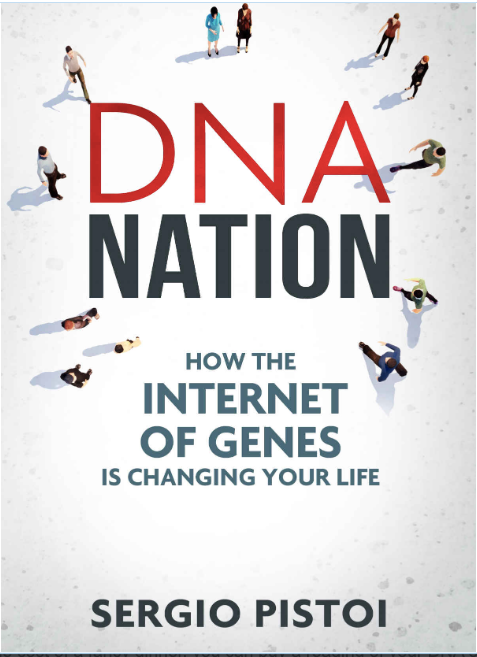
In the April 1, 1993 issue of Wired, in my little article The Extinction of Extinction, I mused that, someday, "Heaven may well be a huge directory of DNA codes". Although that date was April Fool's Day in many parts of the world, I wasn't kidding. In Part 2 of the pathbreaking DNA Nation: How the Internet of Genes is Changing Your Life, Sergio Pistoi details exactly how that could come to be.
His tour, engagingly written and socially astute, just like Part 1 of this book, takes us from the mechanics of gene harvesting and analysis to the replacement of laboratories with crowdsourcing as the locus of DNA subjects. As I pointed out in New New Media back in 2009, the same level of error in the expert-driven Encyclopedia Britannica and the crowd-sourced Wikipedia demonstrated as far back as 2005 that crowdsourcing was at least as effective as experts in the accumulation of knowledge. Pistoi explains that, in the ongoing linking of genes to crucial and trivial aspects of our lives, the "democratization" of genetic research is already becoming far more effective than studies in labs. “I’m sitting on the couch, barefoot, holding a laptop and watching TV and someone tells me I am contributing to a genetic study," Pistoi notes. "Is that a joke?” (p. 104). In his savvy, entertaining style, Pistoi shows us why it most certainly is not.
But Pistoi also repeatedly cautions and explains how so much our lives, at present, defy any genetic explication. He notes that "Predicting multigenic characteristics from DNA is like watching a party of people and guessing where they will choose to go for dinner" (p. 72), adding, as just one of many examples, that "sexual preferences are multifactorial traits involving many genetic and non-genetic factors, most of which are still unknown" (p. 99). We, accordingly, need to beware of companies "selling digital snake oil" (p. 91). The upshot, ranging from choice of sexual partners to food preferences, is that genetic causes, though now discoverable in ways totally unavailable for most of our history, are still poorly mapped, if known at all, for huge swaths of our daily lives. Including, for better or worse, frequency of "orgasms" in a typical sexual session.
And, speaking of sex, Pistoi brings a commendable moral gauge to his book. He concludes his debunking of the "gay gene" - that homosexuality is a genetic predisposition - with an insistence that "people should not have to justify their sexual preferences for other consenting adults" (p. 102). In addition to being a molecular biologist, science reporter, and chronicler of how genomic sites like 23andMe are "similar to social media like Facebook, Instagram and Google, which offer free services in exchange for the user’s data" (p. 107), Pistoi applies a keen moral sense, which enhances the pleasure of reading his book.
And I'll be back soon with one or two concluding reviews of the rest of this eye-opening new book.
See also DNA Nation (Part 1, Chapters 1-5): Reconfiguring the Human Family ... DNA Nation (Part 3, Chapters 14-17): Two-Edged Swords ... DNA Nation (Part 4, Chapters 18-24, Epilogue): Talkative Cookies
"DNA was the ultimate dossier"

No comments:
Post a Comment